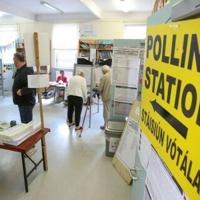Slovakia began its polling stations for EU-wide elections on Saturday amidst the aftermath of the recent shooting of Prime Minister Robert Fico.
This marked the midway point of the four-day European Parliament elections being held across the continent.
Most of the EU’s 27 countries, including Germany and France, will hold their votes on Sunday.
Italy, the EU’s third-largest economy, will start voting later on Saturday, with the results expected to significantly impact the configuration of the parliament and the future direction of the bloc.
The assassination attempt on Fico on May 15 by a 71-year-old poet shocked Slovakia, a nation with a population of 5.4 million, and sent ripples throughout the EU.
Fico, visibly thinner after the incident, released a video message before the polls, blaming his attacker as “an activist of the Slovak opposition” engaged in “aggressive and hateful politics”.
His party, which highlighted the attack in its campaign, is against EU arms shipments to Ukraine and criticizes alleged “warmongers” in Brussels.
Violence was also reported elsewhere in the EU, with Danish Prime Minister Mette Frederiksen being attacked in Copenhagen on Friday. She escaped serious injuries and the assailant was arrested, although the motive remains unknown. Denmark is set to vote on Sunday as well.
EU Commission chief Ursula von der Leyen condemned the attack on Frederiksen, but Fico’s shooting has been the most dramatic incident in the EU leading up to the elections.
In the aftermath, support for Fico’s left-wing populist party has surged past its liberal rival in voter-intention polls.
Nevertheless, Slovakia historically has had low turnout in EU elections, with only 22 percent of voters participating in the last election in 2019.
– Meloni, queenmaker? –
Looming ahead is Italy’s vote on Saturday, where far-right Prime Minister Giorgia Meloni is eyeing a strong performance to boost her influence as a key player in the EU.
Polls indicate that her party, the Brothers of Italy, could lead with 27 percent of the vote, part of a wider gain for far-right parties across the EU.
This could position Meloni as a potential decision-maker, as her support may be crucial in determining the reappointment of von der Leyen as the head of the commission.
Meloni has been courted by von der Leyen and French far-right leader Marine Le Pen, who aims to form an EU alliance of far-right parties.
Meloni’s focus is on relegating left-wing EU parties to the opposition, but her exact plans remain undisclosed.
A strong showing in the elections could further solidify Meloni’s influence in Italy’s erratic political landscape.
Meloni has portrayed herself as a staunch opponent of illegal immigration, a position that resonates with the growing anti-immigration sentiment across the EU.
Polls suggest that far-right parties could secure a quarter of the seats in the new EU parliament.
In the Netherlands, where elections were held on Thursday, the anti-immigration party led by Geert Wilders secured second place, indicating a rise in far-right influence in the country.
The performance of pro-European parties in the Netherlands offered hope to centrists aiming to counter the far-right surge.
Despite this, the conservative European People’s Party and the center-left Socialists and Democrats are still on track to be the largest groups in the EU parliament.
del-rmb/ach





